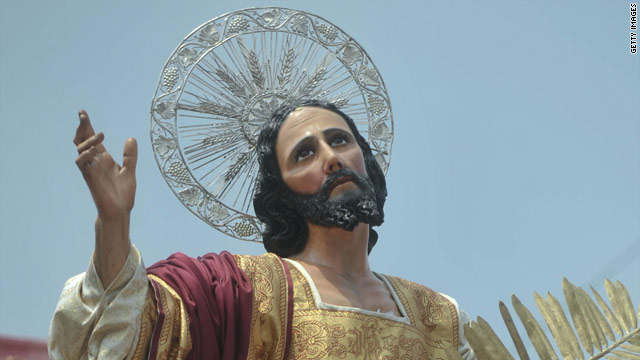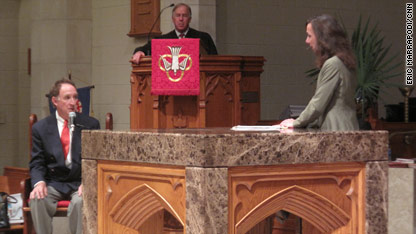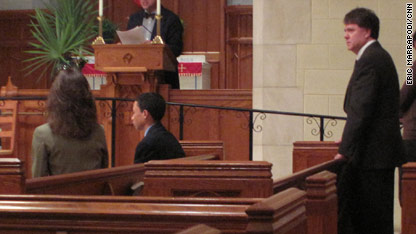![]()
![]()
|
|
|
Want to send this page or a link to a friend? Click on mail at the top of this window. |
|
|
|
Posted April 22, 2011 |
|
|
|
|
|
|
|
|
Finally, Jesus on Trial |

By Eric Marrapodi, CNN Belief Blog Co-Editor
Richmond, Virginia (CNN) If Jesus were tried in Richmond, Virginia, today, would he have been sentenced to death? Or would he have faced life behind bars with no chance for parole?
That's the choice given to jurors here recently.
During Lent, the Church of the Holy Comforter used Virginia law to retry the sentencing phase of the blasphemy case against Jesus of Nazareth. Church members and guests played the role of the jury.
The trial was the brainchild of Mark Osler, a former U.S. Attorney in Detroit who teaches at the University of St. Thomas Law School in Minneapolis and is friends with a member of the Richmond church.
Osler wanted to hold the trial in part to call attention to the state's use of capital punishment. Virginia is second only to Texas in the number of executions per state since the mid-1970s, when the U.S. Supreme Court reinstituted the death penalty, according to federal statistics. He held a similar event in Texas a few years ago.
"For many of us our faith, as it relates to policy especially, is often unexamined," Osler said "We're surrounded by people who feel the same way, and what we need to do is have it be troubled at least and see if that takes us someplace different."
The mock sentencing phase was held the night before Palm Sunday.
Osler played the part of Caiaphas, the Jewish high priest in the biblical narrative of the trial. In that account, Jesus had no defense council. But on this night, Osler faced off against Jeanne Bishop, a real-life public defender from Chicago.
"Jesus was indigent," Bishop said. "And so I think [Osler] wanted a public defender to underscore the point that this is a man with no money, no resources, no position in society."
"Most of the people that I represent fit that description."
"He also wanted to have a young African-American man play Jesus, and that's what we have tonight. Most of clients look exactly like this young man who will be sitting beside me," she said.
The night was bittersweet for Bishop. "My younger sister, her husband and their unborn baby were murdered 21 years ago today, the day before palm Sunday."
In 1990, Nancy Bishop Langert was killed during a home invasion in Winnetka, Illinois. Her death was part of the reason Jeanne Bishop became a defense attorney and an outspoken opponent of the death penalty.
Even before her sister's murder, Bishop said, she was against the death penalty. "When my sister and her husband and their baby were killed, my immediate response was, 'No more killing, no more bloodshed, please let it stop right here.'"

Jeanne Bishop questions a witness at the trial of Jesus in Richmond, Virginia
Osler is also against the death penalty. It was a decision he said he reached as a prosecutor while sitting in church one Sunday.
"'They read John 8, about stoning the adulteress, and I'm like everyone else - when I hear a story like that, I put myself in the role of Jesus. A lot of prosecutors who are Christians who talk about that will say, Jesus said go and sin no more.'" And what I came to eventually is, I'm not Jesus. I'm part of the mob. I'm somebody with a stone in my hand."
"I think that story is very direct that we don't have the moral authority to execute prisoners," Osler said.
Playing the role of prosecutor and asking jurors to condemn Jesus to death was difficult for Osler.
"It's very dark to have the prosecutor in me go to war with the faith [in me]. There's a cynicism you need to be a good prosecutor," he said. "It's been in some ways a troubling enterprise, and I didn't see that coming."
"We donβ't have a script," Osler said shortly before taking the stage at the Church of the Holy Comforter. "We're approaching this the way trial lawyers would. I haven't known what her theory of the case is or what her arguments will be, and she doesn't know mine. That's the way it really works. Itβs not a play. It really is a trial in that sense."

Mark Osler waits to take the stage at the trial of Jesus
As the audience took their seats, Bishop leaned over and whispered to her client, a teenager from the church who sat beside her in a dark blazer and khaki pants.
William G. Broaddus played the role of the judge. He was Virginia's attorney general for six months after his predecessor stepped down to run for governor. During that time, five defendants were executed in Virginia.
"We will now call the case of the Commonwealth of Virginia versus Jesus of Nazareth," Broaddus bellowed from the pulpit. "I will remind you this man has already been found guilty of the criminal charge of blasphemy."
"Tonight it is your duty to determine the proper punishment," he told the jurors.
The attorneys each called two witnesses. The prosecution called Peter, one of Jesus closest disciples, and a rich young ruler whom Jesus urged to sell all of his possessions and give the money to the poor, here though the witness was played by a woman from the congregation. The defense called a centurion whose slave Jesus had healed, as well as Malchus, a high priest's slave whose ear was cut off by Peter then reattached by Jesus.
The sentencing trial followed the rhythms of a standard criminal case. Bishop spoke gently yet firmly as she questioned the witnesses, her line of questioning seeking to emphasize Jesus' acts of compassion and mercy.
Osler was forceful and tried to paint Jesus as a rebel who sought to rend the fabric of society. He also played heavily on the issue of slavery in his questioning.
Richmond was an international slave port prior to the Civil War - a fact not lost on members of the audience, who quietly bristled or frowned when Osler brought it up. He repeatedly reminded them that while Jesus healed the centurion and high priest's slaves, he did not set them free.
In her closing argument, Bishop told the jury that Jesus loved his enemies. "A man who showed such compassion is at least deserving of your compassion at this moment," she said.
Osler rebutted that Jesus had "poked a hole in the fabric of society. Are you going to let it tear or are your going to keep it a small hole?" he asked as he tore a hole in his own pressed, white button-down shirt to gasps in the crowd.
After the closing arguments, the audience broke into several juries of 12. Following the Virginia state statutes, they had two votes to consider. First: "Do you find that there is a probability that, if not executed, the defendant would commit criminal acts that would constitute a continuing serious threat to society?"
If they answered yes to that question, they were instructed to move on to the second: "In the light of all mitigation, is a death sentence warranted?" Both questions required a unanimous vote.
In one of the juries, 11 members quickly agreed the answer to the first question was yes, but there was one holdout. The other jury members began to press her in favor of the prosecution. Eventually they were successful.
"I think he's convincing," an older woman on the panel said of Osler, adding, "I didn't like myself for thinking that."
As the judge told the crowd they had just five minutes left to deliberate, the noise in the sanctuary grew louder and more heated.
The votes were taken and the jury forms passed forward.
The judge stepped forward and read the verdict.
"Jesus please stand," he said.
He read the first question aloud and said, "The majority of the juries have found that should be answered in the affirmative."
It meant the juries thought Jesus would blaspheme again if not executed.
"Turning then to the next question," he said. "The majority of the juries voting on that issue found that the death sentence is not warranted."
There was applause from the audience.
"The defendant is remanded to the jailer for the rest of your natural life."
And with that the trial ended.
![]() © 2010 Cable News Network. Published April 22, 2011.
© 2010 Cable News Network. Published April 22, 2011.
| Wehaitians.com, the scholarly journal of democracy and human rights |
| More from wehaitians.com |